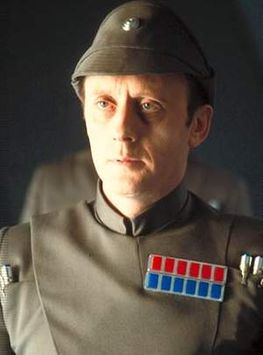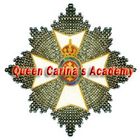
|
This wiki is closed in favour of the new wiki. Information shown is likely to be very out of date. |
Sir Firmus Piett
| Admiral Sir Firmus Piett | |
| Profile | |
| Origin | |
| Occupation | Commander of the West Fleets |
| Gender | Male |
| Affiliation | Bretonia Armed Forces |
| Service Time | 13 months |
| Rank | Admiral |
| Status | Active (819A.S.) |
| Born | June 6, 782 A.S., Planet New London |
Firmus Piett, born on June 6th, 782 A.S. on Planet New London, is Admiral of the Bretonia Armed Forces. He joined the royal navy at the rank of Lieutenant and quickly reached the rank of Commodore after 10 months of service. He was placed as Commander of the 2nd Fleet, with Headquarters Planet Leeds, and 7th Fleet, with HQ Battleship Derby. Currently is Commander of the 12th West Fleet with HQ Battleship Stirling and is in charge of Dundee and Edinburgh systems.
I. Background
Early Independent career
Piett began his naval career, serving with the antipirate fleet. Piett was forced to work in the native sector of Dublin system on board of his Bretonia Gunboat. That was and continue to be one of the most dangerous sectors, and any attempts to bring an order is associated with heavy opposition. The enemies in this sector are many, from independent pirates and mollies to dangerous corsairs and wilders. Despite this, Piett soon was given command of the antipirate fleet. It was then renamed in to Bretonia Royal Fleet, consisted of several fighters and bombers, four gunboats, tree destroyers and two battleships. Piett's record with the fleet was flawless, and he made a tremendous amount of "arrests and suppressions." The Bretonia Royal Fleet numbers continue to increase. It had seven battleships, five destroyers as well as other small escort crafts. In time the fleet was spread all over Bretonia space in order to secure the safty of its sovereign. Soon enough, Piett's reputation reached the Admiralty board of the Bretonia Armed Forces, as he received various commendations.
Late Independent career

Firmus Piett continue to serve with the Independent Bretonia Royal Fleet, on board of their flagship HMS Royal Sovereign. With an extraordinary number of arrests and suppressions to his name, as well as what appeared to be a perfectly clean record, Piett earned the attention of the high-ranked officers from the Admiralty board. In the late stages of his career, Piett proved himself an excellent captain of the bretonian dunkirks as well as good tactician. After many battles, where he increased his abilities to command, he received the permission to join the Bretonia Armed Forces with the rank of Lieutenant. Nevertheless the Piett's flagship continue to be part of the Bretonian Royal Fleet while it's captain slowly but progressively was building his reputation in the ranks of the Bretonia Armed Forces.
Officer of the Armed Forces
In his first months, as Lieutenant from the armed forces, Firmus Piett took part of multiple missions and operations. He continue to work in Dublin sector which was the Hell Hole of Bretonia. The molly and gaian attacks were something normal that happened every day. The corsair fleets were moving in to Dublin too and shooting everything which is not on their side. The Dublin Campaign was dangerous but it helped the young Lieutenant to create a cease of the situation and to impact with the problems, in this remote world, in person. Slowly the campaign of the antipirate fleet in Dublin reached its end. All ships were spread across Bretonia space and Dublin was let in the hands of the primary fleet of the Bretonia Armed Forces. Nevertheless few ships from BRF can still be noticed in some sectors of Bretonia doing their best to secure the peace.
Firmus Piett took part at the signing of the Omega Treaty between Rheinland and Bretonia, which happened in Cambridge system. He was in charge of the capital ships, protecting the sector, commanding them from HMS Royal Sovereign. The operation was threatened by a small corsair bomber squad and several fighters. With the combined powers of the Rheinland Military and Bretonia Armed Forces, the corsairs were easily dealt with. Later in Omega-3 system, more corsairs arrived but this time with some capital escort vessels, trying desperately to reach Cambridge system and to bring chaos in the diplomatic event. Capital ships and escort vessels separated from the primary fleet and moved to Omega-3. Several minutes later the corsair plague come to an end. The Treaty was signed and our guests were escorted back to their borders.
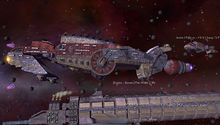
Months after these encounters Firmus Piett reached the rank of Commander and took part in to an Economic event. The Bowex company ordered a massive mining operation in Cambridge system, where Bretonia Armed Forces had to take part as heavy escort support. Several battleships as well as two destroyers and multiple fighters were sent to accompany one of the largest ships in Sirius, the Barge. The mission was simple, five Hegemon class ships and several small mining drones had to mine over 40 000 cargo of the precious Beryllium Ore. Due to the increased security of the system, as well as the traps that were placed to counter possible corsair attacks, the event ended as planned and Bretonia received hundreds millions of credits.
Knight of Bretonia
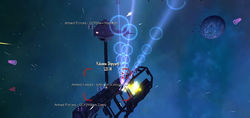
One of the most dangerous operation of the armed forces was the attack on Yukawa Shipyard. Bretonia Armed Forces had information of possible transfer of more than 20 000 prisoners of war deep in to Kusari space. These men had to be saved at all cost and returned back to Bretonia. The main operation was separated in tree parts to reduce the chances of Kusari Naval Forces to notice the true meaning of the attack. Captain Piett was the squad leader of the assault on the Yukawa Shipyard. This station was the only one that could produce the deadly Kusari Destroyer class vessels. It had to be at least damaged enough to reduce the production of these ships for weeks and hopefully for months. A small squad of Templar fighters were escorted from members of the Queen Carina's Privateers through secret holes in to the unknown space. Hours later all tree squads were in right positions and the operation started. The Kusari Naval Forces defense consisted of destroyer and gunboat patrols. Later they were reinforced by unknown enemy, an experimental kusari destroyer armed with unknown weapons. Admiral Fraser, the leader of the entire operation, sacrificed it's flagship, the HMS-Degobaz, to help the remaining forces to finish the experimental ship. Members from the Convoy had contacted the armed forces pilots, informing them that the prisoners of war are back home. Later the remaining fighters had to retreat back to Bretonia and celebrate the victory they had achived. With minor losses and several hours later, the strike team was in orbit of Planet Leeds.
In this day, admiral Fraser awarded captain Firmus Piett with the title to become a Knight Commander of the Order of the Bretonian Empire, the highest of them titles, for his operation that helped the 20 000 prisoners of war sent to dead, to be saved and returned home.
Member of the Admiralty Board
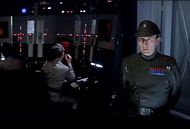
At 3th september, 819 A.S. , Sir Piett received a message from the fleet admiral of the armed forces, Sir James Ralston, that his hardworking service led to his promotion as an admiral and member of the honored admiralty board of Bretonia. Sir Piett was moved from his old position as Commander of the Leeds Defense fleet in to charge of Edinburgh and Dundee systems with Headquarters, Battleship Stirling. His flagship, HMS-Royal Sovereign, was then moved to support Stirling's fleet at Dundee. It can be seen today, fighting neverending waves of kusari invaders, trying desperately to breach the Bretonia West borders.
II. The Charger of the Knight
When Piett first joined the Bretonia Armed Forces, he couldnt hide his discontent from the Templar ship. It was too heavy for him and yet not as powerful as the rumors said. It's hull was created from the strongest of all alloys and that high bonus to the ship, was it's main weakness, reducing its maneverability at the level of a small but fast freighter. After many training sessions with the best members of the armed forces, observing multiple fighter battles even while on board of HMS Royal Sovereign, Piett started to test the abilities of this, from first look bad fighter, at max. He ordered the engineers of Southampton Shipyard to modify his own fighter and make it more maneverable than other Templar ships. After many days of hardwork, the engineers had menaged to give what the captain wanted. The next improvment was to upgrade the guns of the ship, by making them fire at slow rate but providing more damage than the normal bretonia splitters, which had quick fire rate but doing moderate ammout of damage. The experimental Mini Razor guns that many jumped to use as primary gun, were not the kind of a weapon he wanted. His tactical thought pointed at the Disruptors. To control the battlefield by activating the mines whenever he wanted, to stop the fleeing and possibly cruising capital ships were stratigically superior from his point of view, than using a gun that requires patience and time to land a proper hit. The Mini Razor can't stop a battleship to cruise to a base or friendly ship. Mini Razor may do damge and win a duel but that was not the way to win a battle where a single Cruise Disruptor may decide the end of the encounter. Many tests were made and Piett was finaly in one with his ship, just like the Knight is one with his battle charger.
III. Trainer in the renewed Queen Carina's Academy
After many months doing his duty, serving Bretonia with all his pation, Sir Piett was promoted to the rank of Commodore and appointed as recruiting officer. That is why his first act was to increase the value of the recruiting programs, by re-open the Queen Carina's Academy. These actions led to the inviting of new wave of pilots. Tree cadets signed in the first day and weeks later, over nineteen. Tree of them stoped their education for their own reasons, but approximately of fourteen cadets that left, did their best to finish their combat training and join the ranks of the Bretonia Armed Forces. The academy was let by Sir Firmus Piett and commodore O'Dukes aka Lord Hamilton. They both were leading two different classes. Sir Piett took part in teaching the new cadets the ways of the templar, combat hours, while commodore O'Dukes took part in diplomatic hours. To ensure the classes are understandable to the cadets, Lord Hamilton writed a book of his own "QCA Diplomatic Manual".
Queen Carina's Academy is open even now and is working hard to ensure the recruits, or formally the cadets, are ready for the dangerous missions in the future of their career as military pilots and knights of Her Royal Majesty Queen Carina I.
IV. Awards and Titles
1.Distinguished Service Cross
- Awarded to Armed Forces personnel for extraordinary service in non-combat roles.
2.Knight Commander of the Order of the Bretonian Empire
- Highest National Honor, awarded by the Queen for extraordinary personal service to Bretonia. Confers upon the holder the honorific "Sir" to be recognized by all Bretonian citizens.
